Councils warn of rise in housing waiting lists as landlords sell up
- Snap survey of district councils shows that 76 per cent of councils have seen an increase in landlords selling up properties.
- Shortages are particularly bad in councils areas popular with tourists, with landlords switching their properties to more profitable short term holiday lets.
Councils warned today of a growing crisis in the private rented housing sector, with a sharp rise in landlords selling up or converting their properties into Airbnb’s.
76 per cent of councils surveyed by the District Councils Network (DCN) said that this had caused a rise in housing waiting lists, causing more people to lose homes, and making it harder to find permanent accommodation for those in need. 48 per cent of these councils said they were now experiencing a significant pressure on housing services due to this.
One council in a popular tourist destination in the south-west of England has reported a nearly 80 per cent drop in the number of open market, long term rental accommodation available in their local authority area over the last three years, with many landlords leaving the market or providing short term accommodation for holiday makers instead.
This news comes at the same time as a report by property agent Zoopla revealed that rents in the private rented sector have reached a thirteen year high, with a 6 per cent increase in the last year. Councils are reporting that this rise is forcing some long term tenants to apply for hardship support from their local authority, with some council areas seeing rents rise to over a third higher than the average salary in their local area.
Councils are warning that the housing benefit many suffering hardship receive will likely not be sufficient in the longer term, as the Government looks set to keep Local Housing Allowance rates, which determines the amount of benefit received, frozen over the next year.
Landlords are leaving the market due to the impact of the pandemic, with tenants unable to afford their rents, landlords requiring to move into a property themselves and a rise in ‘staycations’, leading to a boom in the short term holiday let market.
The District Councils Network, who represent nearly 200 district councils across the country, is calling on the Government to increase investment in council housing and give councils the tools they need to create their own permeant housing for people in their communities in hardship.
District councils stand ready to work with government to proactively increase the supply and quality of homes for benefit claimants, ensuring those in need can have a permanent roof over their heads in their local communities in the future.
Cllr Sam Chapman-Allen, Chair of the District Councils Network said:
“This survey reveals a perfect storm of problems creating a crisis in the private rented sector across the country.
“Now the Government’s Eviction Ban has ended, this is a problem that could get worse, with councils also seeing increase in the numbers of tenants needing housing support due to increased evictions due to rent arrears.
“During the pandemic, district councils and the government worked together to help protect those who are most vulnerable through the Everyone In initiative, the temporary banning of no-fault evictions, and other measures such as furlough and the Universal Credit uplift.
“We need to urgently tackle this issue by permanently lifting housing benefit for tenants in private rented housing and for increase in Government support to invest in a renaissance of council house building to create homes, jobs and growth.”
Ends
Notes to Editors:
These findings come from a survey of 71 district councils about local housing pressures, with responses being submitted from June 2021 through to the end of November 2021. The full findings can be made available on request.
Contact: District Councils Network Media Office, 020 7664 3333





